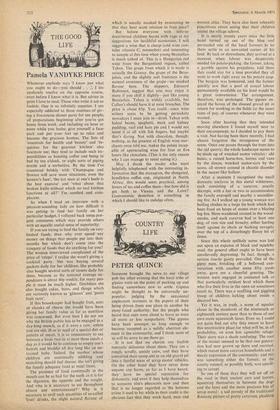THE GOOD LIFE Pamela VANDYKE PRICE
Whenever anybody says 'I know just what
you ought to do—you should . . I im- mediately resolve on the opposite course, even before I know what it is. But advice in print [love to read. Those who write it are so foolish. One is so infinitely superior. I am especially addicted to those routines of giv- ing a five-course dinner party for ten people, all preparations beginning after you've got home from work, and including an hour or more while you bathe, give yourself a face- pack and put your feet up to relax and become the gracious hostess. The lists of 'essentials for health and beauty' and 're- quisites for the gourmet kitchen' also fascinate me; they tend to include such im- possibilities as banning coffee and being in bed by ten o'clock, or eight sorts of piping nozzle and a sorbetiere. By the time I've countered briskly with 'Champagne and flowers will save most situations, even the hostess's face', 'the tax man at one's heels is the best exercise' and 'what about that broken knife without which no real kitchen functions at all?' I'm soothed and com- placent.
So when I read an interview with a pleasant-sounding lady on how difficult it was getting to feed her family on her particular budget, I volleyed back some pun- gent comments which may provide others with an equally useful sense of superiority.
If you are trying to feed the family on very limited funds, then why ever spend- any money on things that people put into their mouths but which don't come into the category of foods that do anything for you? The woman interviewed complained of the price of 'crisps'. I realise she wasn't giving a cocktail party. She was buying several packets daily for her children. She probably also bought several sorts of sweets daily for them, because as the national average ex- penditure is about 40p weekly, for many peo- ple it must be much higher, Doubtless she also bought cakes, buns, and things which are variously known as 'gateaux' and 'petits fruit tarts'.
If this housekeeper had bought fruit, nuts or chunks of cheese she would have been giving her family value as far as nutrition was concerned. But even then I do not see why the British public has to be engaged in a day-long munch, as if it were a cow; unless you are old, ill or in need of a special diet or pattern of meals, it is as unnecessary to eat between a basic two or at most three meals a day as it would be to continue to empty one's bowels and bladder all day long like an un- trained baby. Indeed, the mother whose children are continually nibbling and munching should feel shame; she isn't giving the family adequate food at meal times. The presence of food continually in the mouth can be as bad for the teeth as it is for the digestion, the appetite and the weight.
And why is it necessary to eat throughout almost any entertainment?- Why is it necessary to swill such quantities of so-called 'fruit' drinks, the slight natural flavour of
which is usually masked by sweetening so that they bear scant relation to fruit juice?
But before everyone with telly-in- doctrinated children bursts with rage at my suggestions for healthful economies, I will suggest a wine that is cheap (and wine con- tains vitamin C, remember) and interesting to sample at this time when young Beaujolais is much talked of. This is a Hungarian red wine from the Burgenland region, called Taban. The grape from which it is made is actually the Gamay, the grape of the Beau- jolais, and the slightly soft fruitiness is the natural sweetness of the grape—no masked flavour here. The shippers, Edouard Robinson, suggest that you may enjoy it more if you chill it slightly—just like young Beaujolais. Taban is widely available, but Cullen's should have it at most branches. The price is about 65p. You could—since wine writers seem to be getting pernickety nowadays I must join in—drink Taban with baked beans, spaghetti, steak and kidney pudding, veal and ham pie and I would not mind it at all with fish fingers, but maybe that's daring. Not with chocolate, though; nothing, as the greatest of English wine mer- chants once told me, makes the palate incap- able of appreciating wine for four or five hours like chocolate. (This is the only reason why I can manage to resist eating it.) May I thank the reader who most helpfully telephoned with the interesting in- formation that the mazagran, the elongated, handleless coffee cup, originated in North Africa; this would seem practical, among lovers of tea and coffee there—but how did it get both to Vienna and the Loire? Gastronomic detection is something in which I should like to indulge often.


































 Previous page
Previous page